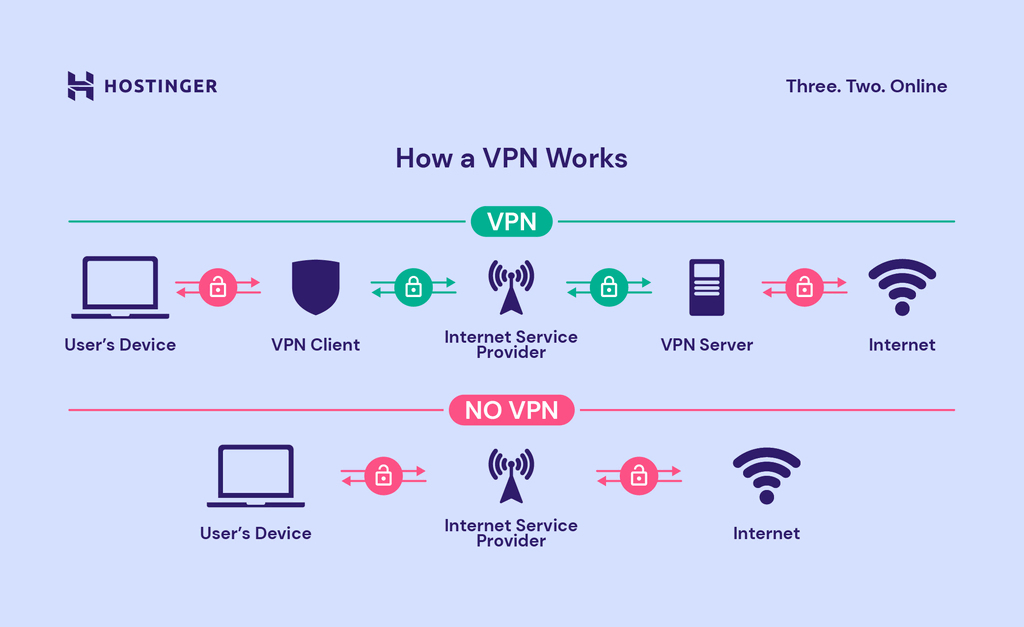A VPN stands for Virtual Private Network. It helps keep your online activities safe and private. This article will explain what a VPN is, how it works, and why you might want to use one.
How Does a VPN Work?
A VPN creates a secure connection between your device and the internet. It acts like a tunnel. This tunnel hides your online activities from others. Here’s how it works:
- Your device connects to a VPN server.
- The VPN server connects to the internet.
- Your data travels through the secure tunnel.
- Your IP address is hidden.
This means your online actions stay private. No one can see what you do online. Not even your internet service provider (ISP).
Why Use a VPN?
There are many reasons to use a VPN. Here are some main benefits:
1. Privacy Protection
When you use a VPN, your data is encrypted. This makes it hard for anyone to read. Your personal information stays safe. You can browse the web without worry.
2. Security On Public Wi-fi
Public Wi-Fi is not always safe. It can be easy for hackers to steal your data. A VPN adds a layer of security. This helps protect your information on public networks.
3. Access To Blocked Content
Some websites are blocked in certain areas. A VPN can help you access these sites. It changes your IP address to one from another location. This way, you can visit any site you want.
4. Bypassing Censorship
In some countries, the government blocks certain websites. Using a VPN can help you bypass these restrictions. You can access information freely.
5. Better Online Gaming
Some gamers use VPNs to reduce lag. A VPN can help connect to game servers faster. This can improve your gaming experience.
Types of VPNs
There are different types of VPNs. Here are some common ones:
1. Remote Access Vpn
This type connects individual users to a remote server. It is commonly used by people working from home.
2. Site-to-site Vpn
This type connects entire networks. It is often used by businesses with multiple locations.
3. Personal Vpn
These are for individual users. They help protect personal devices like smartphones and laptops.
Choosing a VPN Provider
Not all VPNs are the same. Here are some tips for choosing a good VPN provider:
- Check the Privacy Policy: Make sure they don’t keep logs of your activity.
- Look for Strong Encryption: A good VPN uses strong encryption methods.
- Read User Reviews: See what other users say about their experience.
- Consider the Price: Compare different plans and choose one that fits your budget.

Setting Up a VPN
Setting up a VPN is usually easy. Follow these steps:
- Choose a VPN provider and sign up.
- Download the VPN software or app.
- Install the software on your device.
- Open the app and log in.
- Select a server and connect.
Once connected, you can start browsing safely.
Common Misconceptions About VPNs
Many people have misunderstandings about VPNs. Here are a few:
1. Vpns Are Only For Tech Experts
Many people think only tech-savvy users need a VPN. This is not true. Anyone can use a VPN easily.
2. Vpns Are Free
Some VPNs are free, but they often have limits. Paid VPNs usually offer better security and features.
3. A Vpn Makes You Completely Anonymous
A VPN increases privacy, but it does not make you completely anonymous. Other factors can still reveal your identity.
Frequently Asked Questions
What Is A Vpn?
A VPN, or Virtual Private Network, creates a secure connection over the internet. It helps protect your online privacy.
How Does A Vpn Work?
A VPN works by encrypting your internet traffic. It sends your data through a secure server, hiding your IP address.
Why Use A Vpn?
Using a VPN keeps your information safe from hackers. It also helps you access restricted content online.
Is A Vpn Safe To Use?
Yes, a VPN is generally safe. It encrypts your data, making it hard for others to see your online activity.
Conclusion
A VPN is a powerful tool for online safety. It helps protect your data and privacy. Whether you are browsing, streaming, or gaming, a VPN can enhance your experience.
Choose a reliable VPN provider. Follow the steps to set it up. Enjoy safer and more private internet browsing.

Frequently Asked Questions (FAQs)
1. Is Using A Vpn Legal?
Yes, using a VPN is legal in most countries. Always check your local laws.
2. Can A Vpn Slow Down My Internet?
Sometimes a VPN can slow down your internet. This depends on the server speed and distance.
3. Can I Use A Vpn On My Smartphone?
Yes, most VPNs have apps for smartphones. You can protect your mobile data easily.
4. Will A Vpn Protect Me From Viruses?
No, a VPN does not protect against viruses. Use antivirus software for that.
5. Can I Use A Vpn For Streaming Services?
Yes, many people use VPNs to access streaming services. Just check if your VPN works with those services.
Final Thoughts
Understanding what a VPN is can help you stay safe online. With the right VPN, you can enjoy a more private and secure internet experience. Take the time to choose the right one for your needs.
